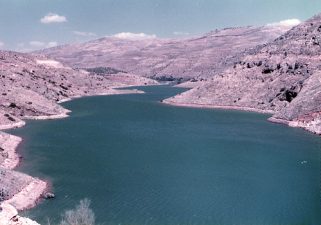Rainwater tanks have become an essential item in Israel where people are afraid that an Iranian attack will threaten their domestic water supply. But like the ancient Nabateans who knew how to sequester water in the desert, the modern Swiss collect water from farm roofs and homes to water their gardens. They may pay a tax in Switzerland, but the rain is either free or cheap and it’s charged with beautiful ions that plants love.
It might seem obvious but in countries starving and on the brink of disaster from an internal terror group taking over, Yemeni farmers are finding relief in growing their harvest but getting access to basic farming tools such as rainwater collection systems. The UN is helping give them the know how to build rainwater tanks. The Houthis in Yemen are using water as a weapon in war. But a not so sophisticated water pool can pull people out of misery

A farmer’s field in Yemen. With the construction of rainwater tanks farmers can now grow vegetables year-around in Utmah district, Dhamar Governorate.
The UN reports that Yemen’s agriculture sector, a lifeline for millions and a cornerstone of the nation’s economy, has been severely affected by extreme climate change. Continued conflict with the Houthis has further exacerbated the situation, contributing to one of the world’s worst humanitarian crises and widespread food insecurity.
In an effort to address water scarcity caused by climate change, two rainwater harvesting tanks were constructed in in Bait Al-Samhi Village, Dhamar Governorate, improving access to water for community members. Each rainwater tank has the capacity to hold 940 cubic metres of water.
Fouad, a farmer in Bait Al-Samhi Village, is confident that the project will significantly increase production in the coming season. He explains, “We rely on rainfall to irrigate our crops. During the winter, our lands become dry, and agriculture ceases due to the lack of irrigation water. Before the project, the situation was very difficult. We had no source to irrigate our crops after the rains stopped, which led to crop failure and financial losses. Now, after the project, the situation has changed. I can farm even after the rainy season.”

Working against the Houthis to give rainwater to the Yemenis
Rainwater harvesting tanks enhance food security for families by supporting farmers to reclaim degraded agricultural lands, and improve irrigation systems. Mutee, the coordinator of the local community committee, says, “Climate change has affected agricultural lands in the region. Due to water scarcity, many people have abandoned farming.”
Related: The man from Japan who watered Afghanistan
Mutee explains that the project was implemented to ensure continued farming activities of the local population, which is their primary source of income.
He adds, “The project has positively impacted community members by expanding their cultivated lands, increasing crop production, and improving their living conditions.”
Saeeda, a mother of five, pictured below, was strongly affected by land degradation due to climate change.

She says, “I grow corn and vegetables during the rainy season, but in winter, farming stops due to water scarcity.”
She explains how the rainwater harvesting tanks will enable her to continue farming after the rainy season.
“Now, I have been able to cultivate two plots of land and will increase the cultivated area with the irrigation from the tanks. Things have changed, and I feel happy when I see my farm green and the crops thriving without damage.” Saeeda hopes her land will remain green enough to cultivate several times in a single season.
The project has created job opportunities for local community members in Bait Al-Samhi, providing income and helping them to acquire new skills through a cash-for-work program.
Related: can clay jugs filter water?
Bader, a father of six and a community member who worked on the rainwater harvesting tanks project, says, “The project provided me with a temporary job for 45 days, which helped me support my family and meet their basic needs while serving the community.”
“In addition to improving agricultural production in the long term, the rainwater harvesting tanks have created job opportunities to help people financially,” says Abdullah, an engineer and project officer with UNDP’s local partner, SFD. Pictured below.
Related: 5 ways to use air conditioning water

The project has increased local farming areas and improved food security by providing approximately 124 farmers with access to alternative water sources.
A great start. Now how can all farmers get access to this beautiful and easy opportunity?
Study the opportunity to help Yemen below (in Arabic).
UNDP Yemen — Rainwater tanks bring relief to farmers in Dhamar, Yemen [AR]






